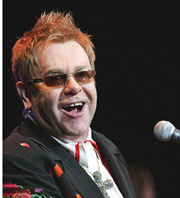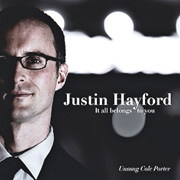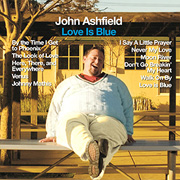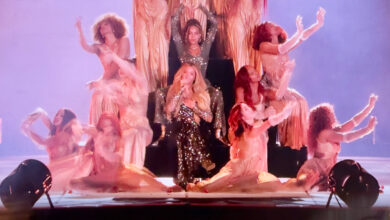After Elton
For Pride, a roundup of new queer music (this month, the men).

Since the 1974 release of his multi-platinum Greatest Hits disc, Elton John‘s hit-making abilities have been acknowledged in an array of domestically released compilations, including a multi-disc box set and a thorough, chronological double-disc collection from 2002. Rocket Man: Number Ones (Mercury) is the kind of anthology that Sir Elton might have wanted to reconsider, especially since he hasn’t had a “number one” since “Can You Feel the Love Tonight?” in 1994. Nevertheless, the 17-track disc does boast a dozen chart-topping singles, including “Goodbye Yellow Brick Road,” “Daniel,” “Philadelphia Freedom,” the Kiki Dee duet “Don’t Go Breaking My Heart,” “Don’t Let the Sun Go Down on Me” (the George Michael duet version), and “Sacrifice,” to name a few. Someone must have realized that 12 tracks might appear a bit skimpy, so the disc features five “other favorites,” including “Rocket Man” and the original version of “Candle in the Wind.”
What of the gay male musicians who have arisen in Elton’s wake? Take Reuben Butchart, for example. Like John, he is a piano man, through and through, and on his luminous second full-length disc, Golden Boy (reubenbutchart.com), he proves himself to be a performer and songwriter to reckon with. A recipient of an Outmusic Award for his 2003 debut, Dusk, Butchart has exceeded all expectations with Golden Boy. Working with talented group of musicians, including Antony (of Antony and the Johnsons), Butchart has recorded a dozen radiant original tunes whose glow lingers long after the CD ends. Beginning with “Come & Play,” an invitation that is almost impossible to resist, and continuing with the aptly named “So Much Soul,” the disc gets off to a shining start. “Belle of the Ball” is the kind of song any sister would be proud to have her brother write and sing about her, while “Northern California” has hit single written all over it. Family is a recurring theme on the disc, including in “Cartoon Heroes,” while “Flash & Click” is unabashedly queer. This Golden Boy is a man to watch.
 Justin Hayford is another gay man at a piano. But his specialty lies more in the “neglected treasures” and “forgotten gems” category. His latest disc, It All Belongs to You (LML), doesn’t veer much from his established repertoire, subtitled as it is Unsung Cole Porter. The dozen tunes, about which Hayford has written informative liner notes, have something about them that makes them unmistakably Porter. And Hayford’s reverence for such material comes through in each and every one of the renditions.
Justin Hayford is another gay man at a piano. But his specialty lies more in the “neglected treasures” and “forgotten gems” category. His latest disc, It All Belongs to You (LML), doesn’t veer much from his established repertoire, subtitled as it is Unsung Cole Porter. The dozen tunes, about which Hayford has written informative liner notes, have something about them that makes them unmistakably Porter. And Hayford’s reverence for such material comes through in each and every one of the renditions.
The acoustic guitar is the musical instrument of choice for Dudley Saunders. And his distinctive voice, which has a way of stirring up emotional responses, is its own unique instrument. After ending a lengthy recording hiatus in 2005 with his Billy White Acre Sessions EP, Saunders has now released the extraordinary full-length album The Emergency Lane (Fang). The sexy litany of places in which Saunders sings about being found will have more than a few listeners answering the call of opening track, “Look for Me.” The gorgeous arrangement and seductive vocals on “Love Song for Jeffrey Dahmer” belie the disturbing subject matter, while the lush “The Rain on 8th Avenue” recalls early Joni Mitchell. Like Butchart, Saunders’ songs are undeniably queer, a fact that holds true on the hot pop of “Take Me Back Home Again” and the bare blues of “Bad Driver” and “The Wild Men.”
 So what do you say about a project whose concept sounds so promising it practically causes goose bumps, but whose execution ultimately doesn’t live up to its potential? John Ashfield‘s previous discs, both as a solo artist and as a member of the Bobbleheads, were deliriously infectious affairs. On Love Is Blue (johnashfieldmusic.com), a sort of homage to the 1968 Johnny Mathis album of the same name, Ashfield applies his substantial pop smarts to creating new songs using the titles of classic tunes from the 1960s and ’70s, such as “By the Time I Get to Phoenix,” “The Look of Love,” and “Don’t Go Breaking My Heart.” As notions go, this one ranks pretty high on the genius scale, though the result doesn’t reach that height. I suppose someone unfamiliar with the originals might have a different reaction. Nevertheless, the album is far from being a total loss, thanks to “Here, There and Everywhere” (which sounds like something akin to a Stephin Merritt composition), the never boring “Never My Love,” the edgy “Moon River,” the out of this world “Venus,” and album closer “Johnny Mathis.”
So what do you say about a project whose concept sounds so promising it practically causes goose bumps, but whose execution ultimately doesn’t live up to its potential? John Ashfield‘s previous discs, both as a solo artist and as a member of the Bobbleheads, were deliriously infectious affairs. On Love Is Blue (johnashfieldmusic.com), a sort of homage to the 1968 Johnny Mathis album of the same name, Ashfield applies his substantial pop smarts to creating new songs using the titles of classic tunes from the 1960s and ’70s, such as “By the Time I Get to Phoenix,” “The Look of Love,” and “Don’t Go Breaking My Heart.” As notions go, this one ranks pretty high on the genius scale, though the result doesn’t reach that height. I suppose someone unfamiliar with the originals might have a different reaction. Nevertheless, the album is far from being a total loss, thanks to “Here, There and Everywhere” (which sounds like something akin to a Stephin Merritt composition), the never boring “Never My Love,” the edgy “Moon River,” the out of this world “Venus,” and album closer “Johnny Mathis.”

Levi Kreis and Eric Himan are two gay musicians who have toured together. They also released new discs at around the same time. With a background in religious music, Kreis’ The Gospel According to Levi (levikreis.com) finds the singer/songwriter expanding his repertoire but still keeping an eye on the heavens. Everywhere All at Once (Thumbcrown) is a good title for the ubiquitous Himan’s latest effort. The gay community’s emo poster-boy, Himan delivers more of what earned him his rabid following.
Next month: In his annual Pride music series, Gregg Shapiro offers a selection of new music by women.
Gregg Shapiro is a past recipient of the annual OutMusic award that recognizes contributions by non-musicians in furthering the work of GLBT performers.










